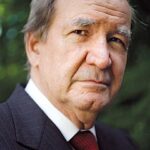By Jonathon Van Maren
As the progressive war on dead men rages on across the United States, vandals chose what might seem like a strange target earlier this month: They spray-painted “[expletive] law” in green on the floor and statue of the Lincoln Memorial. Those who wish to wage war on those who lived in different times and possessed different sensibilities will not stop with Confederate generals, as we are already seeing. Once the progressive standards of what constitutes “hate” are implemented—an ever-expanding category in our age of grievance and identity politics—no historical figure will be safe. All will be weighed in the bizarre balances of the post-modernists and found distinctly wanting.
Many commentators are already warning that no nation can stand being wracked with division for this long without inevitable escalation. At Antifa protests and alt-right rallies, thugs from both sides of the spectrum have already moved from smashing statues of dead men to striking the faces of live ones. Indeed, it is pointless to say that the centre cannot hold, because there is no centre anymore, no unifying point that men and women from every walk of life can rally around. Such a centre did exist once—Christianity.
America’s founders believed that Christianity was essential to preserving their new nation. On October 11, 1798, John Adams wrote to the Massachusetts Militia explaining the limitations of the new republic in those terms. “We have no Government armed with Power capable of contending with human Passions unbridled by morality and Religion. Avarice, Ambition, Revenge or Galantry, would break the strongest Cords of our Constitution as a Whale goes through a Net. Our Constitution was made only for a moral and religious People. It is wholly inadequate to the government of any other.”
Perhaps the vandals chose the Lincoln Memorial because that great president recognized this, as well. On March 30, 1863, he declared a Day of National Humiliation, Fasting and Prayer, begging the American people to beseech God for an end to the bloody conflict that divided them. It is a beautiful proclamation:
Whereas the Senate of the United States, devoutly recognizing the supreme authority and just government of Almighty God in all the affairs of men and of nations, has by a resolution requested the President to designate and set apart a day for national prayer and humiliation; and
Whereas it is the duty of nations as well as of men to own their dependence upon the overruling power of God, to confess their sins and transgressions in humble sorrow, yet with assured hope that genuine repentance will lead to mercy and pardon, and to recognize the sublime truth, announced in the Holy Scriptures and proven by all history, that those nations only are blessed whose God is the Lord;
And, insomuch as we know that by His divine law nations, like individuals, are subjected to punishments and chastisements in this world, may we not justly fear that the awful calamity of civil war which now desolates the land may be but a punishment inflicted upon us for our presumptuous sins, to the needful end of our national reformation as a whole people? We have been the recipients of the choicest bounties of Heaven; we have been preserved these many years in peace and prosperity; we have grown in numbers, wealth, and power as no other nation has ever grown. But we have forgotten God. We have forgotten the gracious hand which preserved us in peace and multiplied and enriched and strengthened us, and we have vainly imagined, in the deceitfulness of our hearts, that all these blessings were produced by some superior wisdom and virtue of our own. Intoxicated with unbroken success, we have become too self-sufficient to feel the necessity of redeeming and preserving grace, too proud to pray to the God that made us.
It behooves us, then, to humble ourselves before the offended Power, to confess our national sins, and to pray for clemency and forgiveness.
Now, therefore, in compliance with the request, and fully concurring in the views of the Senate, I do by this my proclamation designate and set apart Thursday, the 30th day of April, 1863, as a day of national humiliation, fasting, and prayer. And I do hereby request all the people to abstain on that day from their ordinary secular pursuits, and to unite at their several places of public worship and their respective homes in keeping the day holy to the Lord and devoted to the humble discharge of the religious duties proper to that solemn occasion.
All this being done in sincerity and truth, let us then rest humbly in the hope authorized by the divine teachings that the united cry of the nation will be heard on high and answered with blessings no less than the pardon of our national sins and the restoration of our now divided and suffering country to its former happy condition of unity and peace. In witness whereof I have hereunto set my hand and caused the seal of the United States to be affixed.
Done at the city of Washington, this 30th day of March, A. D. 1863, and of the Independence of the United States the eighty-seventh.
ABRAHAM LINCOLN.
Such sentiments would today be scorned by the media elites, derided by the progressive politicians, driven from the public schools, and decried by the academics. And yet, Lincoln recognized that the only way the nation could recover was through repentance, prayer, and reliance on God’s patience and forbearing.
It is a shame that we are intent on erasing all memory of our ancestors rather than learning from them. Perhaps we are too stubborn to emulate their humility, or too intimidated by their greatness. As Chesterton once noted, the fear of history is not only a fear of historic injustices, as is so often stated—it is “a fear not merely of the evil in the past, but of the good in the past also. The brain breaks down under the unbearable virtue of mankind. There have been so many flaming faiths that we cannot hold; so many harsh heroisms that we cannot imitate; so many great efforts of monumental building or of military glory which seem to us at once sublime and pathetic. The future is a refuge from the fierce competition of our forefathers. The older generation, not the younger, is knocking at our door.”
It is easy to decry the wickedness of evil men or the shortcomings of great men. It is far more difficult to compare ourselves to them, and realize that we can never measure up. In the face of their accomplishments, we can throw tantrums and demand that their memory be eradicated, or we can strive to learn from both their failures and their successes.
____________________________
For anyone interested, my book on The Culture War, which analyzes the journey our culture has taken from the way it was to the way it is and examines the Sexual Revolution, hook-up culture, the rise of the porn plague, abortion, commodity culture, euthanasia, and the gay rights movement, is available for sale here.








